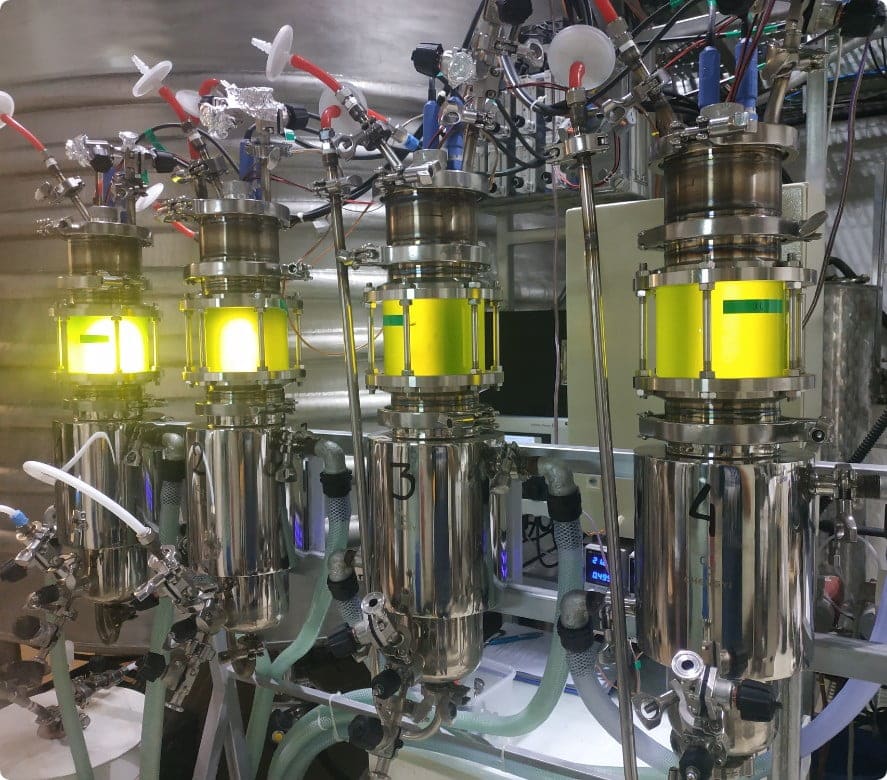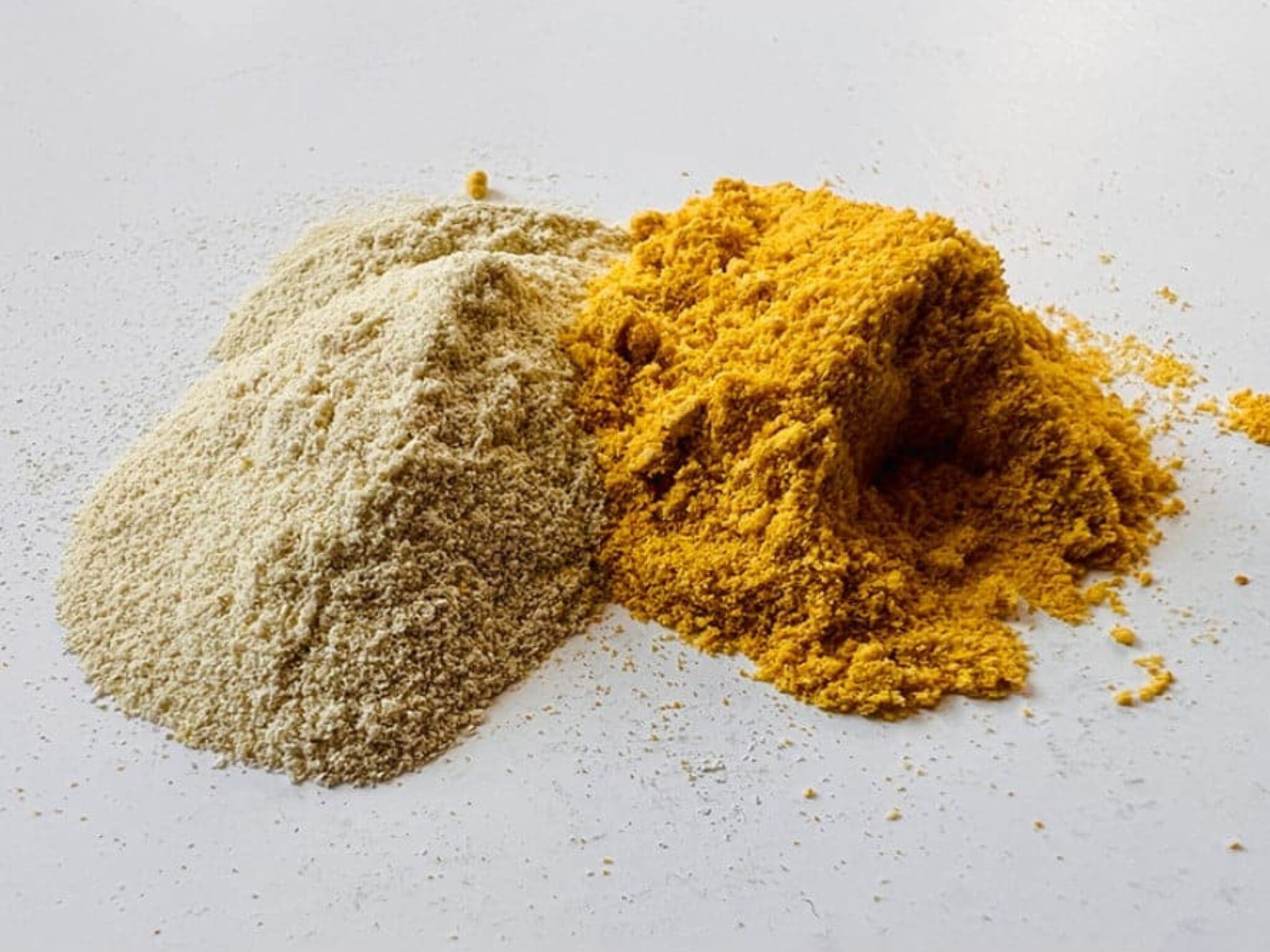Brevel Opens Microalgae Protein Factory to Create Superior Plant-Based Dairy Analogues
5 Mins Read
Israeli startup Brevel’s first commercial-scale facility will churn out hundreds of tons of microalgae protein powder to supply the plant-based dairy industry.
Biomass fermentation player Brevel has opened a 27,000 sq ft commercial plant on the edge of the southern Israeli desert, which can produce hundreds of tons of microalgae protein for use in vegan cheese and other dairy analogues.
Renovating an existing building in Kiryat Gat to fit its needs, the project took about a year to complete, and will enable the Israeli startup to manufacture its non-GMO, planet-friendly protein powder at an industrial scale.
“Following test runs, the factory will be operational by the end of this year,” Brevel co-founder and CEO Yonatan Golan tells Green Queen. “We have [bioreactors] in all ranges from three litres, 50 litres, 500 litres, and now our new 5,000-litre bioreactor. We will be able to scale further to a total of 30,000 litres in this facility.”
He added that the microalgae biomass it produces won’t just be used to extract protein, but also co-products like polar lipids, fiber, pigments and more. The facility expects to roll out its first products by Q1 2025, with a planned debut in the US. Additional international factories are on the horizon too.
Using microalgae for functional, high-protein dairy analogues

Brevel was founded in 2017 by Golan and his brothers Ido (CTO) and Matan (COO), and employs a technology that unites light and fermentation into a single process, a feat the CEO describes as akin to “putting an electric motor into a Tesla car”. “It may sound like a very simple straightforward task to achieve, but is actually extremely complex,” he says.
“Fermentation has been confined to dark environments and is instrumental in producing extremely high yields. However, microalgae’s natural makeup of nutrients – including protein, lipids, fibre, and pigments – depend on photosynthesis for their development and growth,” he explains.
Brevel uses a strain of microalgae from the Chlorella family, a widely commercialised and highly important source of single-cell protein. This thrives in Brevel’s bright conditions, and has a regulatory advantage – it’s been classed as safe for human consumption by the FDA’s GRAS system in the US, and has been part of the EU’s safe list of novel foods for decades.
“To extract the protein, we developed a unique downstream minimal process that does not involve any solvents or chemicals. It is safe and retains the high quality and nutritional value of the protein, as well as the very high functionality,” says Golan.
The result is a white microalgae powder with 60-70% protein concentration and a full amino acid profile. Its “negligible” climate footprint adds to the functional superiority of the ingredient, which will appeal to plant-based meat and dairy producers.
Brevel is first targeting the alt-dairy market, a segment that doesn’t yet have a plant protein solution with zero flavour or colour compromises, according to Golan. “Our protein is completely white and has a neutral flavour, which enables alt-dairy manufacturers to significantly increase nutritional values and benefits for consumers while maintaining the sensory experience,” he says.
“The protein is very easy to use – similar to how one would use soy or pea protein,” he adds. “We have a team of food technologists and an advanced application lab in our new factory, in which we develop and finetune formulations that allow… maximal value for our partners.”
To demonstrate its capabilities, visitors to the new facility – a group of over 150 investors, food tech startups, government representatives, and food manufacturers – were given a taste of a range of vegan cheeses made using the microalgae protein. It’s an example of the pain points Brevel is looking to address – research suggests that a majority (73%) of Americans are unhappy with the flavour and texture of non-dairy cheese. It’s perhaps why household penetration remains so low: while 97% of US households buy conventional cheese, only 7% purchase dairy-free analogues.
Sidestream valorisation drives down financial and carbon costs

Brevel, which has raised $22.5M in funding, has equipped its new facility with advanced bioproduction labs, spacious working environments, a modern food application lab, and state-of-the-art quality control equipment.
One of the startup’s key differentiators is the low production costs, which are on par with soy and pea proteins. This is facilitated by its efforts to valorise the algae sidestream – instead of discarding the byproducts from the manufacturing process, Brevel uses them to make clean-label emulsifiers and nutritional boosters for functional foods and supplements.
“The reason that soy protein is cheap is because protein is only one of the sidestreams extracted from the soybean, alongside oil, fibres, gluten and others,” says Golan. “Co-products are a key part of Brevel’s business model… The combination of light and fermentation enables the production of a large variety of valuable co-products, and not mere basic sidestreams.”
Making use of byproducts further cuts the company’s climate footprint – food waste accounts for up to 10% of global emissions – and supports further food applications. “The polar lipids will be used as a functional emulsifier in food applications, the soluble fibres will be used in food applications as well, the pigments as high-value health supplements, and we are looking into additional fractions as well,” he explains.
Brevel will supply its protein to manufacturers across the globe, some of which are investors in the startup. While Golan doesn’t go into specifics when asked about strategic partners, he reveals that two of them are dairy and beverage companies worth over $2B, and a couple others are interested in building large manufacturing facilities as joint ventures.
”We have strategised several joint-venture partnerships in the US, Europe, and Asia. The result will be the construction of larger facilities to fulfil growing demands for our sustainable protein in multiple applications,” Golan says. These facilities are set to have fermentation capacities of 900,000 litres and beyond, and while their production capacity will depend on the joint ventures’ needs, this is expected to range between thousands and tens of thousands of tons annually.
“Following these, the final target is to reach capacities of millions of tons to meet the demand of the growing plant-based food industry,” he suggests. Golan adds that Brevel currently has a “long enough runway to work with” in terms of capital, but is “always speaking with investors” over its long-term vision.
It is among a host of startups leveraging the potential of microalgae, which is set to be a $25.4B market by 2033. These include Checkerspot, Mewery, Quazy Foods, Ocean Kiss, Algama, Sophie’s Bionutrients, and Triton Algae, among others.



